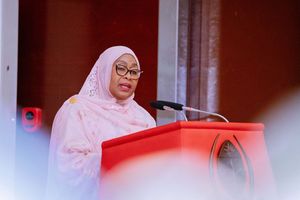If you don’t honour Gorbachev, you get more Putins

In this file photo taken on December 21, 2004 Russian President Vladimir Putin (R) talks to former Soviet President Mikhail Gorbachev (L) prior to a joint press conference of German Chancellor Gerhard Schroeder and Putin at Gottorf castle in Schleswig. PHOTO/AFP
What you need to know:
- The West had the opportunity to welcome Russia into its fold, as Gorbachev and even Putin had hoped, but it did not.
In the early 1930s, an American diplomat visited the Soviet Union and returned to America awestruck, stating, “I have seen the future, and it works.”
Yet, by the time Mikhail Gorbachev came to power in 1985, the USSR was not working. The leadership was in a shambles. The USSR had buried three heads of state in three years. To avert bankruptcy, the government had resorted to selling vodka. Food imports consumed 40 percent of foreign exchange. Yet the USSR had to support many vassal states around the world.
The situation was unsustainable.
The task of carrying out the necessary reforms fell to Gorbachev, the final Soviet leader, who died in Moscow on August 30, 2022. Gorbachev ended up pulling the thread that held the USSR together and it crumbled.
As a result, Gorbachev became a pariah in Russia, thanks to one Vladimir Putin. According to a 2017 poll, only 15 percent of Russians had a positive view of him. When he died, he was not granted a state funeral, and Putin opted not to attend. Some politicians even went so far as to proclaim him “worse than Hitler”.
In the West, the greatest beneficiaries of the collapse of the USSR, leaders posted tweets and released statements, then rushed back to their usual businesses. The same happened in Africa. Indeed, if Gorbachev hadn’t been too big to ignore, his death could have gone unnoticed here.
The world has squandered a golden opportunity to honour a great man. And by failing to do so, we will wind up generating more Putins.
Gorbachev, like Stalin in the 1930s, started by taking gradual steps to boost economic output. When that did work, he believed that large reforms were unavoidable. That’s when he implemented his signature programmes – perestroika and glasnost. Perestroika was geared at restructuring the inefficient centrally-planned economy, and glasnost aimed at pushing leaders to be more responsive to the public through political openness.
Internationally, Gorbachev announced that the Soviet Union would not meddle in the domestic affairs of its satellite republics in Eastern Europe. He withdrew Soviet forces from Afghanistan. He advocated the absolute abolition of nuclear weapons, but Roland Reagan’s America would not go quite that far.
These events had a profound global impact. They enabled many nations to break free from Soviet domination. The Berlin Wall fell in 1989 and, with it, the Iron Curtain. This signalled the end of the Cold War without shedding a drop of blood.
One can look at Poland today and understand what that means. A sizable nation in central Europe, Poland immediately embraced democracy and abandoned communism. It used its comparative advantages to attract FDI and grow its economy. As a result, GDP per capita has leapt forward ten times in 30 years.
However, at home, Gorbachev’s reforms had serious unintended consequences. The USSR was a party-dominated state, and Gorbachev’s attempts to detach the state from the Communist Party ended up weakening both the party and the state, and the USSR was exposed as a house of cards.
But Russia was not built to last. Its systems were riddled with inconsistencies. It was impossible to keep the country together without tyranny, no matter how hard Gorbachev tried. Some may dismiss him as an idealist who didn’t know any better, but Khrushchev, Brezhnev, and Andropov all attempted to change the country’s systems before him. Being a communist purist, though, he believed that it was his mission to restore communism from those who had corrupted it.
When assessing Gorbachev’s legacy, it is important to acknowledge that the USSR was an evil empire that had to fall. While the West has been fittingly chastised for its imperialist history, Russia has sailed through unscathed. Given its support for African liberation efforts, many on the continent exempt it from criticism. However, as soon as you scratch the surface, you begin to unearth a rotting core. The demise of the Soviet Union and the end of the Cold War were tremendous blessings for the entire globe.
But what happened to Russia itself was unfortunate. The West had the opportunity to welcome Russia into its fold, as Gorbachev and even Putin had hoped, but it did not. Europe and America donated billions to other countries, yet even when Russia was approaching economic collapse, no assistance was provided. Worse yet, by expanding Nato, the West maintained its Cold War posture. Ultimately, the West betrayed Gorbachev’s dreams and gave their vanquished rival, Russia, another reason to go rogue. Speaking of grabbing failure from the jaws of victory.
Authoritarian leaders today may look at Gorbachev and conclude that attempting reforms is not a worthwhile endeavour. However, the values that Gorbachev stood for are too lofty to dismiss. He must be remembered as one of the finest models of values-based leadership in modern history, maybe at par with greats such as Mandela, Luther, and Gandhi.
A prosperous and inclusive Russia would have been a fitting conclusion to Gorbachev’s story. But the world is not always that kind. Even so, regardless of where we stand, we live in a better world than the one that existed before him. And for that, he certainly deserves our respect.




